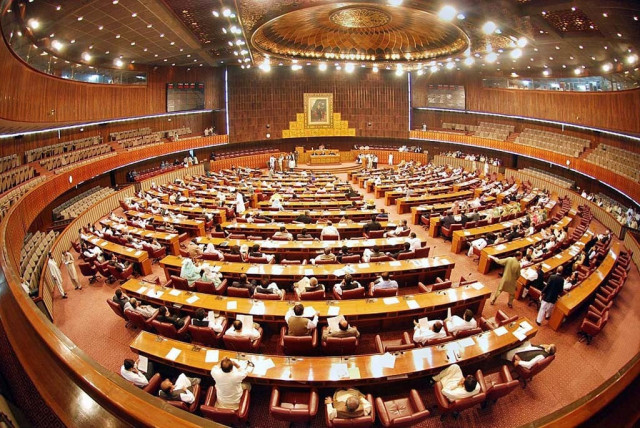Law approved to remove SOE boards
Govt amends law despite objection from allies, opposition parties

The National Assembly on Wednesday approved amendments to the State-owned Enterprises (SOEs) law to replace boards of government-owned companies without following a rigorous process amid serious objections from allies and opposition parties.
The government completed the legal process to amend the law within 24 hours despite objection from its main ally – the Pakistan Peoples’ Party, which described the revised law as “non-transparent” and tantamount to “coup d’état”. The government completed the process of seeking the approval of the National Assembly Standing Committee on Finance and the National Assembly in less than half a day.
“Given compulsion of the government, we will go along with the government and pass the bill but there is a lot here that needs to be improved,” said Syed Naveed Qamar of the PPP and Chairman of the National Assembly Standing Committee on Finance.
The committee approved the bill with a majority vote, though members belonging to the Pakistan Tehreek-e-Insaf (PTI) opposed the amendments. Naveed Qamar said that the bill lacked transparency, but hoped that the government would bring further amendments within a reasonable time.
“There is immense pressure on the government, which is reflected from the presence of three federal ministers sitting in the standing committee,” said Omar Ayub, the Leader of Opposition in the National Assembly.
“For privatisation, we have to inject fresh blood and fresh thinking into power distribution companies (DISCOs),” remarked Energy Minister Awais Ahmad Khan Leghari. For that purpose, he added, the government wanted to change the existing boards of DISCOs. However, as chairman of the board nomination committee, the power minister has already approved the appointment of one retired bureaucrat as the chairman of three boards to replace the existing boards.
In its summary, the Power Division blamed the existing 10 boards of DISCOs for power-sector losses of Rs589 billion in the just-ended fiscal year.
Naveed Qamar, also a former power minister, questioned how board members could be held responsible for wrongdoing of the past. President Asif Ali Zardari last month promulgated an ordinance to remove a legal hurdle that had prevented the government from sacking the boards of all loss-making DISCOs.
The National Assembly on Wednesday approved the State-Owned Enterprises Governance and Operations Amendment Act 2024 to give permanency to the ordinance. The government made amendments to three different sections of the SOE Act 2023, which had become a hurdle in the way of implementing PM Sharif’s decision to sack the boards of eight DISCOs.
Major changes have been made in Section 13. According to the existing law, a director shall hold office for a period of three years, unless he resigns in writing or is removed earlier in accordance with provisions of this Act.
“I suspect that the IMF has asked for these amendments, as these amendments are meant to capture power and it’s like a coup d’état,” said MNA Nafeesa Shah of the PPP.
But Law Minister Azam Nazir Tarar was of the view that the directors of those boards were enjoying perks and privileges without doing anything.
Through the amendments, the government has inserted two conditions. The first condition says “provided that for reasons to be recorded, the federal government may remove a director or directors on the recommendation of the board nomination committees”.
Another provision has been added in sub-section 2 of Section 13, which states that directors can be removed without any inquiry on the recommendation of the board nomination committee. The new amendments carry serious repercussions. “We know we have become a banana republic but do not become a cheap banana republic,” said Omar Ayub in his criticism of the new law. He said that the government had taken absolute authority to appoint and remove the boards, which was against the concept of good governance.
Finance Secretary Imdadullah Bosal said that under the existing law, it was difficult to remove the boards which, after receiving first show-cause notice, take stay orders from courts. The government has also made amendments to Section 4 of the SOE law and reduced the purview of the SOE policy by excluding the process of evaluating the performance of ex-officio and independent directors from its domain.
Through an amendment to Section 10, a new section 3A has been inserted which states, “In carrying out its functions under Clause C and D of sub-section 2 of Section 10, the board nomination committee shall evaluate the performance of a director or directors of a state-owned enterprise based on the objective and principles laid in Chapter 2, 3 and 4 of this Act, to the extent applicable to a board of state-owned enterprise.”



















COMMENTS
Comments are moderated and generally will be posted if they are on-topic and not abusive.
For more information, please see our Comments FAQ